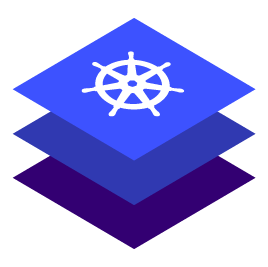Fluent Bit
Fluent Bit is the DKP choice of open-source log collection and forwarding tool.
On the Management cluster, Fluentbit is disabled by default. The amount of admin logs ingested to Loki requires additional disk space to be configured on the grafana-loki-minio Minio Tenant. Enabling admin logs may use around 2GB/day per node. See Release Notes 2.3.0 | Configuring-the-Grafana-Loki-Minio-Tenant for more details on how to configure the Minio Tenant.
Audit Log Collection
Auditing in Kubernetes provides a way to chronologically document the actions taken on a cluster. On Kommander, by default, audit logs are collected and stored for quick indexing. Viewing and accessing can be done via the Grafana logging UI.
To adjust the default Audit Policy log backend configuration, you must modify the log retention settings by Configuring the Control Plane before creating the cluster. This needs to be done prior to creating the cluster since it cannot be edited after creation.
Collecting systemd logs from a non-default path
By default, Fluent Bit pods are configured to collect systemd logs from the /var/log/journal/ path on cluster nodes.
If systemd-journald running as a part of the OS on the nodes uses a different path for writing logs, you will need to override configuration of the fluent-bit AppDeployment to make Fluent Bit collect systemd logs.
To configure the Fluent Bit AppDeployment to collect systemd logs from a non-default path, follow these steps (all kubectl and dkp invocations refer to the management cluster):
Execute the following command to get the namespace of the workspace in which you would like to configure Fluent Bit:
CODEdkp get workspacesAnd copy the value under the
NAMESPACEcolumn for your workspace.Set the
WORKSPACE_NAMESPACEvariable to the namespace copied in the previous step:CODEexport WORKSPACE_NAMESPACE=<WORKSPACE_NAMESPACE>Identify the
systemd-journaldlog data storage path on the nodes of the clusters in the workspace by using the OS documentation and examining thesystemdconfiguration.Usually it will be either
/var/log/journal(typically used whensystemd-journaldis configured to store logs permanently; in this case the default Fluent Bit configuration should work) or/run/log/journal(typically used whensystemd-journaldis configured to use a volatile storage).Extract the default Helm values used by the Fluent Bit App:
CODEkubectl get -n ${WORKSPACE_NAMESPACE} configmaps fluent-bit-0.19.21-d2iq-defaults -o=jsonpath='{.data.values\.yaml}' > fluent-bit-values.yamlEdit the resulting file
fluent-bit-values.yamlby removing all sections except forextraVolumes,extraVolumeMountsandconfig.inputs. The result should look similarly to this:CODEextraVolumes: # we create this to have a persistent tail-db directory an all nodes # otherwise a restarted fluent-bit would rescrape all tails - name: tail-db hostPath: path: /var/log/tail-db type: DirectoryOrCreate # we create this to get rid of error messages that would appear on non control-plane nodes - name: kubernetes-audit hostPath: path: /var/log/kubernetes/audit type: DirectoryOrCreate # needed for kmsg input plugin - name: uptime hostPath: path: /proc/uptime type: File - name: kmsg hostPath: path: /dev/kmsg type: CharDevice extraVolumeMounts: - name: tail-db mountPath: /tail-db - name: kubernetes-audit mountPath: /var/log/kubernetes/audit - name: uptime mountPath: /proc/uptime - name: kmsg mountPath: /dev/kmsg config: inputs: | # Collect audit logs, systemd logs, and kernel logs. # Pod logs are collected by the fluent-bit deployment managed by logging-operator. [INPUT] Name tail Alias kubernetes_audit Path /var/log/kubernetes/audit/*.log Parser kubernetes-audit DB /tail-db/audit.db Tag audit.* Refresh_Interval 10 Rotate_Wait 5 Mem_Buf_Limit 135MB Buffer_Chunk_Size 5MB Buffer_Max_Size 20MB Skip_Long_Lines Off [INPUT] Name systemd Alias kubernetes_host DB /tail-db/journal.db Tag host.* Max_Entries 1000 Read_From_Tail On Strip_Underscores On [INPUT] Name kmsg Alias kubernetes_host_kernel Tag kernelAdd the following item to the list under the
extraVolumeskey:CODE- name: kubernetes-host hostPath: path: <path to systemd logs on the node> type: DirectoryAdd the following item to the list under the
extraVolumeMountskey:CODE- name: kubernetes-host mountPath: <path to systemd logs on the node>These items will make Kubernetes mount systemd logs into Fluent Bit pods.
Add the following line into the
[INPUT]entry identified byName systemdandAlias kubernetes_host.CODEPath <path to systemd logs on the node>This is needed to make Fluent Bit actually collect the mounted logs
Assuming that the path to systemd logs on the node is
/run/log/journal, the result will look similarly to this:CODEextraVolumes: # we create this to have a persistent tail-db directory an all nodes # otherwise a restarted fluent-bit would rescrape all tails - name: tail-db hostPath: path: /var/log/tail-db type: DirectoryOrCreate # we create this to get rid of error messages that would appear on non control-plane nodes - name: kubernetes-audit hostPath: path: /var/log/kubernetes/audit type: DirectoryOrCreate # needed for kmsg input plugin - name: uptime hostPath: path: /proc/uptime type: File - name: kmsg hostPath: path: /dev/kmsg type: CharDevice - name: kubernetes-host hostPath: path: /run/log/journal type: Directory extraVolumeMounts: - name: tail-db mountPath: /tail-db - name: kubernetes-audit mountPath: /var/log/kubernetes/audit - name: uptime mountPath: /proc/uptime - name: kmsg mountPath: /dev/kmsg - name: kubernetes-host mountPath: /run/log/journal config: inputs: | # Collect audit logs, systemd logs, and kernel logs. # Pod logs are collected by the fluent-bit deployment managed by logging-operator. [INPUT] Name tail Alias kubernetes_audit Path /var/log/kubernetes/audit/*.log Parser kubernetes-audit DB /tail-db/audit.db Tag audit.* Refresh_Interval 10 Rotate_Wait 5 Mem_Buf_Limit 135MB Buffer_Chunk_Size 5MB Buffer_Max_Size 20MB Skip_Long_Lines Off [INPUT] Name systemd Alias kubernetes_host Path /run/log/journal DB /tail-db/journal.db Tag host.* Max_Entries 1000 Read_From_Tail On Strip_Underscores On [INPUT] Name kmsg Alias kubernetes_host_kernel Tag kernelCreate a
ConfigMapmanifest with override values fromfluent-bit-values.yaml:CODEcat <<EOF >fluent-bit-overrides.yaml apiVersion: v1 kind: ConfigMap metadata: namespace: ${WORKSPACE_NAMESPACE} name: fluent-bit-overrides data: values.yaml: | $(cat fluent-bit-values.yaml | sed 's/^/ /g') EOFCreate a
ConfigMapfrom the manifest above:CODEkubectl apply -f fluent-bit-overrides.yamlEdit the
fluent-bitAppDeployment to set the value ofspec.configOverrides.nameto the name of the createdConfigMap. (You can use the steps in the procedure, Deploy an Application with a Custom Configuration as a guide.)CODEdkp edit appdeployment -n ${WORKSPACE_NAMESPACE} fluent-bitAfter your editing is complete, the AppDeployment resembles this example:
CODEapiVersion: apps.kommander.d2iq.io/v1alpha3 kind: AppDeployment metadata: name: fluent-bit namespace: ${WORKSPACE_NAMESPACE} spec: appRef: name: fluent-bit-0.19.21 kind: ClusterApp configOverrides: name: fluent-bit-overridesLog in into the Grafana logging UI of your workspace and verify that logs with a label
log_source=kubernetes_hostare now present in Loki.
Related information
For information on related topics or procedures, refer to the following:
